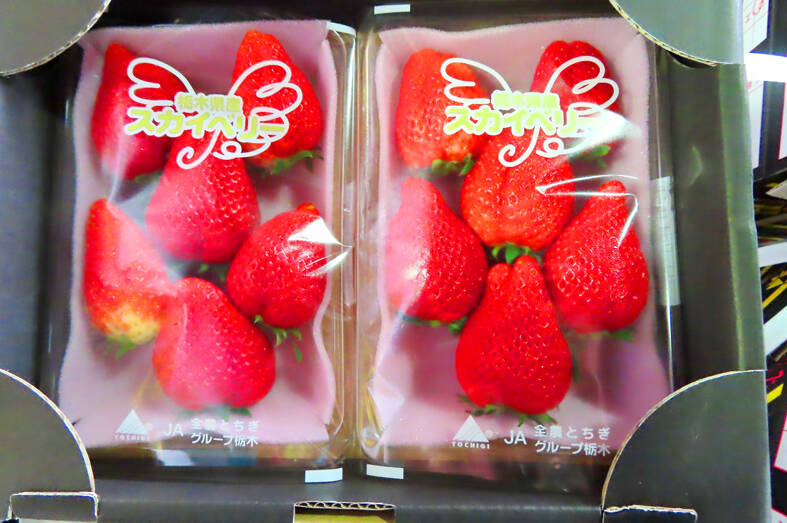Taiwan plans to allow all imports of Japanese food and agricultural products from areas near the crippled Fukushima Dai-ichi nuclear power plant, the Food and Drug Administration (FDA) said on Tuesday evening.
The FDA said in a statement that it is planning to amend regulations to allow mushrooms, the meat of wild birds and other wild animals, and “koshiabura” (foraged vegetables) from Fukushima, Gunma, Chiba, Ibaraki and Tochigi prefectures to be imported.
Apart from those products, Taiwan lifted a ban on food imports from the five prefectures in 2022.

Photo courtesy of the Food and Drug Administration
All food imports from the five prefectures would undergo batch-by-batch inspections under the amended regulations, and radiation readings and certificates of origin would also be required, FDA Deputy Director-General Lin Chin-fu (林金富) said.
More than 235,000 batches of Japanese food have been inspected for radiation at the border since the disaster in 2011, Lin said, adding that only trace amounts, which met Taiwan’s and Japan’s standards, were detected.
As food safety has been confirmed and given that most countries have already lifted restrictions on food products from the five prefectures, Taiwan would remove its import control measures for Japanese products, he said.
Forty-nine of 53 countries and regions that import Japanese food products have completely lifted control measures imposed after the disaster, Lin said.
A 60-day review period is in place and public feedback on the amendments is welcome, the FDA said.
In addition, seafood, mushrooms, tea, dairy products and baby food from areas outside the five prefectures, such as tea from Shizuoka Prefecture, would no longer require radiation certification, it said.
Only proof of origin would be required for those products, the FDA added.
Mai Fu-der (麥富德), a professor at Taipei Medical University’s Department of Biochemistry and Molecular Cell Biology, yesterday said that wild mushrooms and fowl are more susceptible to environmental exposure, and were more exposed to radiation than other agricultural products.
However, the FDA said such food was rarely imported before, so lifting the restrictions was more of a gesture of goodwill, he said.
Provided there is enough staff to examine the products batch by batch and imports remain low, there is comparatively little risk in lifting the restrictions, Mai said.
As it has been more than a decade since the Fukushima Dai-ichi nuclear power plant disaster, and the half-life of caesium-137 is 30.17 years, any risk has significantly decreased, he said.
However, Mai said that his statements were predicated on the FDA’s ability to implement its stringent standards and having sufficient personnel to screen Japanese imports.

Right-wing political scientist Laura Fernandez on Sunday won Costa Rica’s presidential election by a landslide, after promising to crack down on rising violence linked to the cocaine trade. Fernandez’s nearest rival, economist Alvaro Ramos, conceded defeat as results showed the ruling party far exceeding the threshold of 40 percent needed to avoid a runoff. With 94 percent of polling stations counted, the political heir of outgoing Costa Rican President Rodrigo Chaves had captured 48.3 percent of the vote compared with Ramos’ 33.4 percent, the Supreme Electoral Tribunal said. As soon as the first results were announced, members of Fernandez’s Sovereign People’s Party

EMERGING FIELDS: The Chinese president said that the two countries would explore cooperation in green technology, the digital economy and artificial intelligence Chinese President Xi Jinping (習近平) yesterday called for an “equal and orderly multipolar world” in the face of “unilateral bullying,” in an apparent jab at the US. Xi was speaking during talks in Beijing with Uruguayan President Yamandu Orsi, the first South American leader to visit China since US special forces captured then-Venezuelan president Nicolas Maduro last month — an operation that Beijing condemned as a violation of sovereignty. Orsi follows a slew of leaders to have visited China seeking to boost ties with the world’s second-largest economy to hedge against US President Donald Trump’s increasingly unpredictable administration. “The international situation is fraught

MORE RESPONSIBILITY: Draftees would be expected to fight alongside professional soldiers, likely requiring the transformation of some training brigades into combat units The armed forces are to start incorporating new conscripts into combined arms brigades this year to enhance combat readiness, the Executive Yuan’s latest policy report said. The new policy would affect Taiwanese men entering the military for their compulsory service, which was extended to one year under reforms by then-president Tsai Ing-wen (蔡英文) in 2022. The conscripts would be trained to operate machine guns, uncrewed aerial vehicles, anti-tank guided missile launchers and Stinger air defense systems, the report said, adding that the basic training would be lengthened to eight weeks. After basic training, conscripts would be sorted into infantry battalions that would take

GROWING AMBITIONS: The scale and tempo of the operations show that the Strait has become the core theater for China to expand its security interests, the report said Chinese military aircraft incursions around Taiwan have surged nearly 15-fold over the past five years, according to a report released yesterday by the Democratic Progressive Party’s (DPP) Department of China Affairs. Sorties in the Taiwan Strait were previously irregular, totaling 380 in 2020, but have since evolved into routine operations, the report showed. “This demonstrates that the Taiwan Strait has become both the starting point and testing ground for Beijing’s expansionist ambitions,” it said. Driven by military expansionism, China is systematically pursuing actions aimed at altering the regional “status quo,” the department said, adding that Taiwan represents the most critical link in China’s